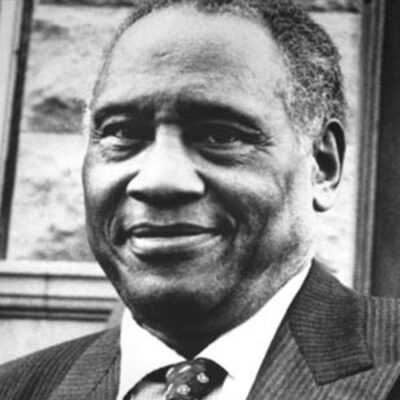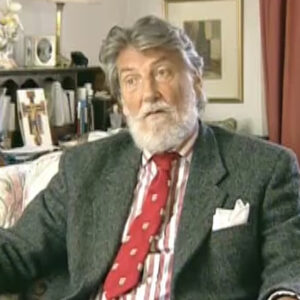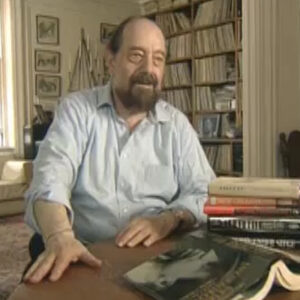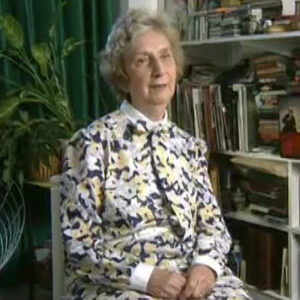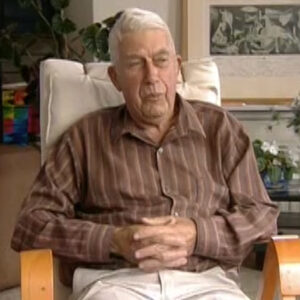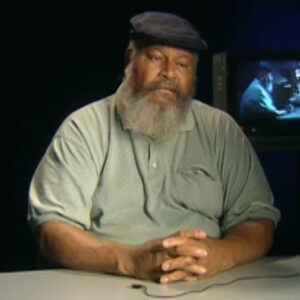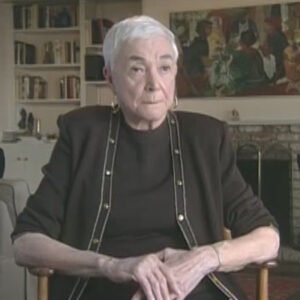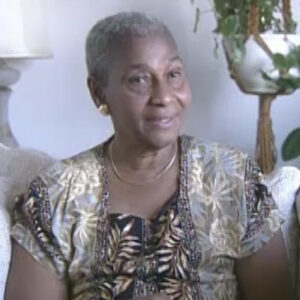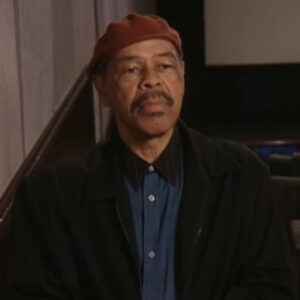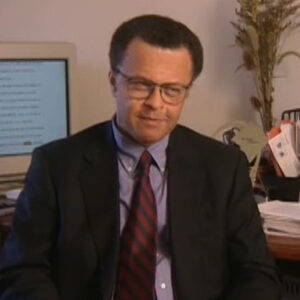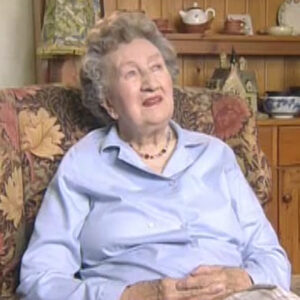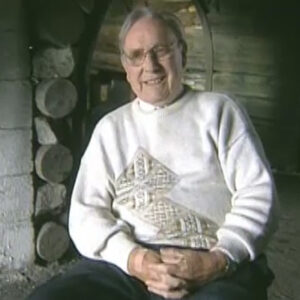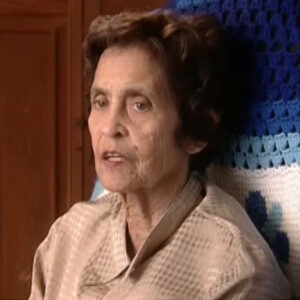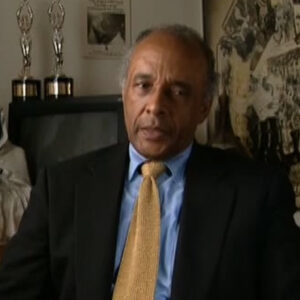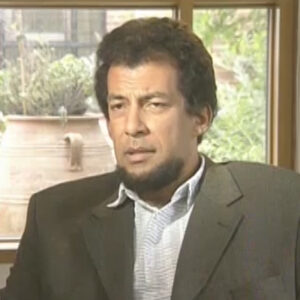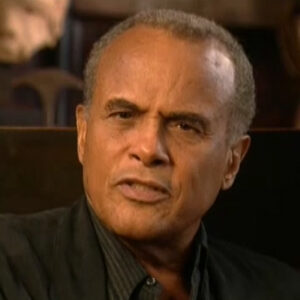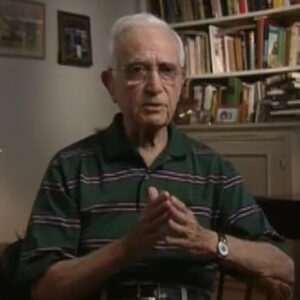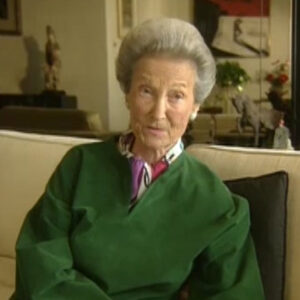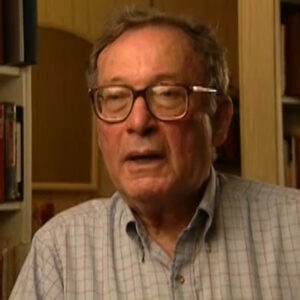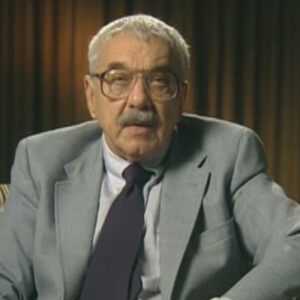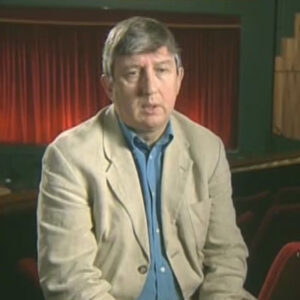Speaker You go up here.
Speaker I did not say 12 months of open year here, you know?
Speaker Huh?
Speaker Well, you know what I taught for 20 years in Virginia, but I still came back here to you know, I left my summer clothes and just took my winter clothes. So it really wasn’t work here. I mean, nobody can really work here.
Speaker No, there wasn’t any work here. I was across the street from the school and I couldn’t get a job over there.
Speaker So I said my mother was working over there. You talked about Woodrow Wilson during the time that he was president.
Speaker He he had well, he had been the president of Princeton University and he had some friends over here. He knew something was happening in Germany, but he didn’t know what it was. So he came to Princeton and asked one of his friends. If he would go to Germany and find out what was happening while there were no airplanes in those days, you know, you had to go over and vote. So he went over on a boat. And when he got there, he found out the war was about to begin, but he couldn’t get back because he couldn’t get going to airplanes to fly back. So he stayed over there much longer. And my mother, who was pregnant when she went to see about this professor’s wife, had had me. So I was just born here by accident. We thought they would only be a short time for the professor to go to Germany, so I accidentally got born in my place.
Speaker It’s on my birth certificate. So basically, you grew up in this town? Oh, yeah, I grew up in the south. And, uh, I may say so, but you work other places. I worked a lot of places wherever I could get work.
Speaker I worked at Fort Dix. I worked at the Columbia Presbyterian. I worked in Princeton Hospital. I worked at General Motors. Oh, that was a good place to work. Yes. I went through one of the strikes and I got in for being a female all the time, made most of my money for them at General Motors.
Speaker Is that why when did you I mean, when did you meet Paul Robeson?
Speaker At first he was just up and down the street. You sort of knew him, you know, like, you know, people.
Speaker I don’t like meeting, meeting, you know, he was around the corner and I knew his cousin very well, his cousin was very close to me, was in high school with me.
Speaker So I knew he knew his PA, which seems to me everybody says that. He grew up in this community, people sort of took care of him. Is that true? Really?
Speaker I mean, that, you know, well, people took care of everybody, so I don’t know.
Speaker I imagine he was taking care of two parents, told you what to do, and then didn’t have to be your parents, just people. You know, you couldn’t be mad because they would spank you to.
Speaker No, it was a pretty tight community there.
Speaker Yeah, and we ended everybody’s house and we slept around. I mean, it was death, by the way.
Speaker So the people have a sense that he was going to be special or they just think he was just another just another child, another minister’s child.
Speaker There’s always a little something in a minister’s. They get more than the rest of us.
Speaker So do you think he got more than the rest of you?
Speaker Yes, he got to go to Colombia and get to go to Iraq because he got more than the rest of us.
Speaker How did it happen, though? I mean, it must have been people must to help them. Oh, yes, people helped him, I’m sure.
Speaker What do you know who was?
Speaker Well, I don’t know exactly who they are, but people generally speak to the ministers of a community when they have something to share and they ask, do you can you share it with anyone in the community? Do you have anyone in your church who could use this? And we always say that the minister’s son always gets gets and we don’t get it. But anyway, they get not only that, the Presbyterian ministers, but the Baptist ministers, children and the Methodist minister, children were able to get things. So getting things with something that was really dumb.
Speaker So what kind of what kind of work was there for a young person growing up in this town? What kind of work was available to black, young black person?
Speaker Very, very little. If you were friendly with some of the people who worked and what we call the avenue Prospect Avenue, where the students eat their lunch, you might be able to be the busboy. You couldn’t be the waiter because the older men were the waiters you could help to clean up. You could help do the grass and that type of thing, but there wasn’t very much you could do. The university said all the way to Switzerland and to to other places in in Europe to get people to come over here to work. There were a lot of Italians who came here and worked in the university and the blacks didn’t get jobs to work in university. One thing they did do. The blacks, did they pave the streets? Oh, for some reason, the bear wanted their streets paved. And that was one thing that they did, you know, if Paul ever did that, I guess, you know, Paul didn’t because Paul was too young to do that. He didn’t do that type of work. They were older men who did that. People who had families did that type of work, not the young man.
Speaker Several people told us that.
Speaker You know, when he was in high school, that he began to sing and he also kind of preached sometimes in his father’s church and that people had a sense that he was going to be somebody. When you met him, did you hear that or did you think about that?
Speaker Well, he wasn’t here then. You see, he left here when he was.
Speaker In the eighth grade. See, that’s as far as the school here in Princeton went to the eighth grade, so he was in Somerville or other places in northern New Jersey and he wasn’t here. So we don’t know we lost him then.
Speaker Well, what how old you say you knew him. How old was he when you knew him?
Speaker I don’t know, I wasn’t thinking of age, he was just one of the boys in the neighborhood was in high school, I was in college and now he had to he when I first knew him, he had to be in elementary school.
Speaker Along with his cousins and some of the other relatives, and then he left Princeton, so during that time, I don’t remember.
Speaker Then when I came back later on, some of the boys in the neighborhood had gone to college and he had gone to.
Speaker Uh, could you tell me the story about his trip to, uh, uh, his first trip to, uh, was the Providence, Rhode Island Rhode Island airport?
Speaker There was very little work, as I said, to be done. And Paul, going away from here, he’d gone to, uh, uh, Somerville and some other places in that area, but he wanted to make some money so he could go to college. He came to Princeton. He knew the man in Princeton. You sort of know the older man. You admire them and you know them. And he asked the man if he if they could find a job for him somewhere. They said they would look into it. He said, but you just a schoolboy. And they laughed and they started to call him school boy, Robeson’s school boy because he wasn’t a full grown man. But I looked around, they said, all right, we’ll take you when we go for the summer. Princeton University was never open in the summer, only during the winter season. Even the professors didn’t have work in the summer. They had to find work. The man who worked at the various clubs on the avenue, as we call Prospect Avenue, had nothing to do because they worked serving the meals for the students during the winter session. So they said, well, we’ll find something for Paul to do. We can always give him busboy or something to do. So they took him. They took schoolboy Robeson on with them. These men had sons of their own and they knew how he felt. And his their sons were a little bit younger. So they said they’ll take school boy who was a little older on to Rhode Island. And they took him to where they went, which was Narragansett, Rhode Island. Several of the men, Mr. Griggs and Mr. Moore, Mr. Reeves, many of the men took schoolboy along with him. There was a hotel and they all worked in the hotel doing whatever hotel work they wanted young men to do. They also have a small singing group because the people who lived in Newport, which is across from Narragansets, had beautiful homes and they like to entertain their friends, but they themselves could not sing a word and they would hire the man who worked in the hotel. So they took the men over to Newport to work in these hotel and these beautiful homes. They call them summer homes, the cottages. And if you’ve seen them, they’re gorgeous, gorgeous. And the men themselves who were in the Newport had a lot of money, a great deal of money. They were some of the wealthiest people in the United States of America, the people that ran the various building barriers, I guess we say a Wall Street type people now, but they didn’t call it Wall Street then. They just owned everything. And they would get young people to come over and give a concert for them in their beautiful ballrooms. And they got my father and these other men, along with Schoolboy, to come over and sing and they sang for them. I don’t many of them were impressed with. Schoolboy Robeson, I don’t know whether they gave him money or not. But I know later he went to Columbia University for law and you do need money to go there. So we I’m sorry I didn’t ask my father who Gapo, what money, but some money was handed out. It’s good.
Speaker Do you know would you mind putting the pencil on the paper you’re holding down? Oh, I’m sorry. You have to be a very sensitive man sitting on the bench next to you. We have a very sensitive moment here. Oh, here. Every little thing we hear. Yes.
Speaker I think I just want one more question. Did you know when he left Princeton?
Speaker Had did you ever visit Somerville or know people over there? Go over there while he was there?
Speaker I knew people in Somerville, but I didn’t visit with them.
Speaker The persons I knew in Somerville, I had I had met when I was in camp for the YWCA and when I was in college. But I didn’t look up Paul Robeson. He. As I said, I knew his cousin, who was much younger, but Paul was a little older and was not a young man that I knew when you go to school with college.
Speaker I went to.
Speaker What college, you went to college because I went to a high school here, they had opened the high schools in Princeton by the time I got ready to go to high school. Remember, Paul Robeson couldn’t go to high school in Princeton. They didn’t allow blacks to go to high school. But by the time I was able to go to high school, it was it was easy for me to go to high school.
Speaker I went to college at Virginia State College in Petersburg, Virginia, and I stayed there and I got two degrees. And then later I got a chance to go to the University of Michigan in Ann Arbor. And that’s where I did my father work.
Speaker Where I’m just trying to.
Speaker Can you give me a sense of what it was like growing up here when you were a young girl?
Speaker It was like we enjoyed it. We didn’t know what it meant to be segregated because we had always gone to a black school. But it didn’t bother us because the Italians who also lived in the neighborhood did not go to public school. They went to the Catholic school on Nassau Street. There’s a beautiful Catholic school. And the nuns taught them because the Italians were not treated too well either. The Jewish people went to Trenton every afternoon to finish their Jewish background in their Jewish religion. So we felt and they lived here, too, and we felt that everybody went to their very school. We didn’t know they, the Irish or the other white people. Most of the whites that we learn to learn later were people whose parents taught in the university. So we didn’t know them. Even so, we thought it was what you did. Everybody went to their own school. We enjoyed each other. Our parents knew each other. Many people were related. During the time I was growing up, there were many people who would come up from the south, just as people are coming from various countries now and these people would come from the south, they would be related cousins of each other. And so they were glad to be here. So we had a good time going up. There were four churches and we went to all four churches. There was, and we enjoyed all for the churches, but there was no work as well with the children weren’t interested in. The parents managed. One thing that would happen during the time that people were growing up here on the on the university, they had a lot of food. The students came from the south and they came from various places where their parents had a lot of money. The students did not want to eat anything that was left over. So all that food that was cooked on the avenue had to be eaten by us poor blacks in this neighborhood. So we didn’t worry about food. And as far as clothing was concerned, we had a teacher who taught us how to sew and how to handle our clothes. So so we didn’t have we didn’t worry about anything. We enjoyed Princeton.
Speaker Well, when Paul went to New York to become a lawyer, uh, did people think that it was going to come back and maybe start up a law firm here in Princeton or some those areas, areas?
Speaker You know, we knew there would be very difficult for him to get a job during that. Like, people did not do that type of work in New Jersey. It was very hard. So we didn’t know where he would be going. We were we just hope for the best for him.
Speaker And what happened when word filtered back that he he was getting to be a star, I mean, a singing star where people surprised that, you know, he sang here in Princeton.
Speaker We had heard him sing and we were just aware that other people were interested in his wonderful voice and were willing to listen to it. So, no, we, uh, and we knew it would be very difficult for him to get a job as a lawyer. Almost impossible.
Speaker Interesting what happened also when he. You know, during that whole Red Scare Communist thing, did what was the reaction of the people here?
Speaker Not too much, because remember, we had Einstein and we had other types of people who wore their various clothing that lived on Bank Street. And we knew that the university had all kinds of people that were working there. So it was nothing unusual.
Speaker We had we knew the Jews were having a hard time over in Germany, so we were not worried about that. We said, well, they’ve got power now. You know, that was the idea about it.
Speaker So, I mean, weren’t they scared or.
Speaker No, no more than we’re scared about what’s going on now. No. No, we’re not. No more. And we’re afraid that’s what’s happening in Africa. Some of the other places. No.
Speaker Well, we’re not afraid, but at that point, he was considered pretty special, right? I mean, during the Red Scare, the people here.
Speaker Well, we understood that. Now they’ve got poll after poll. But as I said, we had other people in the universe.
Speaker The university was filled with foreign people. And and many of them were being mistreated, so we knew that that went on, so we were not afraid that will ever come back, you know, either as a young star or as an old one to sort of do things or sing or.
Speaker Oh, yes. He came back to produce some of his plays. He had some in the plays. Some of them were done in Mukada Theater. We have a wonderful theater on the campus.
Speaker It was built so the students could practice their whatever they wanted to practice. As far as activities were concerned, many students who have been part of that activity in McCarter Theater have gone into too many other things in the theater and some of them in Hollywood, you know, so that we when Paul came back.
Speaker We we knew that they were probably trying out something for Paul to do, many of the things that were presented ended up on Broadway and they tried them out here because the reception was very good in the theaters here.
Speaker And so they said, well, the trying it out, I guess he’ll get somewhere, too. So we were glad that he did.
Speaker Um, just a couple of questions as a young man.
Speaker Oh, yeah, yeah, yeah, you can you can answer this any way you want, but as Paul, as a young man, did he have the ladies find him attractive? I think they have a lot of girlfriends and stuff like that.
Speaker Well, yes, he was a football player. For one thing. He was big and tall and he had interesting features. And many of them liked him, not the local people, but people who were at other places thought he was a very handsome man. And, uh, they did look into his background and they entertained him and the local girls and like them.
Speaker Oh, we were not if you were not a college person, you didn’t try to be friendly with a college man because you didn’t fit in.
Speaker And there was a difference between those who were in college and those who were working around. Remember, the girls did things such as cooking for various people and taking care of babies and so forth. And they were not in the same social group that Paul was. And so they knew better of him.
Speaker But I mean, everybody was like, well, they do that now. Now, I mean, you if you were a college person, you don’t go out with somebody who’s playing drums somewhere. I mean, you just don’t there’s a difference. Is it that way in New York? I don’t know. Yeah, some in some places someplace that is not. Yeah, some places. Yeah.
Speaker That’s where it was in Princeton that they were in a different category altogether, although they may have made extra money, they were in a different category.
Speaker Did you think or you know, jump the fence so to speak. I mean he was up in the Kamasi what do you think, that maybe he came back to see some local girls?
Speaker Well, he had some local girlfriends. Yes. People he had known all his life and all that that were active. But they were not in the social group that I knew about.
Speaker You know, we were doing research. We found out he he didn’t really have a lot of friends in the college said, no, they weren’t very many people.
Speaker There were hardly any blacks.
Speaker And I’m sure that his life at might have been sort of sad because, you know, you don’t, uh, you know, they’re not together.
Speaker They’re there. He was one of the few people to go to Rutgers. There are not many people there even now, while they more now, but when it gets to acknowledge that they were separated, did you ever meet his father?
Speaker No, I didn’t. His father had gone from here by the time I got to be a regular time. I only knew his father’s brother.
Speaker We call him Tobe Aubrey’s uncle. Wee, wee, wee, wee, wee Aubrey’s father. We didn’t know Paul’s father.
Speaker And he was not the minister of this church when I got old enough to realize it. But then I didn’t know him. I knew of him. My father was very friendly with another brother of the Reverend Robeson and would, whenever we went to Atlantic City, would always stop by to visit. But I didn’t I didn’t know them as myself. My father was very close to the robots in me and he thought well of the robots and men and he knew them.
Speaker Oh, yeah. I don’t know if you know the answer. What did you hear about why the father had to leave the.
Speaker Well, I did hear that he was very much like Paul, he like to speak out about things that he thought weren’t right. And this the Presbyterian Church, is one reason why I went to the Baptist Church. Really, the Presbyterian Church is under I grew up in New Brunswick and other places.
Speaker And you must do what they say do because the Baptist Church does what it wants to do and vice minister when it wants to. But they couldn’t do that in this church.
Speaker The they had to follow what the group they have a special name for the group in New Brunswick wanted the church to do the head of the church. And they didn’t like what, Reverend. Uh, Robeson was telling the young people in this area to do he was like blackpoll, he don’t, you know, stand up for yourself and get things and tell them what to do. And they touched in the head of the church, the head of the church, it was still white. Remember, this church is not a black church. They have some black people coming here, a majority of them. But the church itself was run by the white people and they tell the church what to do.
Speaker Uh, was there any feeling about, uh, the black community, about Woodrow Wilson?
Speaker Oh, yes, we knew that that was terrible. We knew that he was he was a Southerner and he had all the Southern attitudes. And when he got he was ahead of him.
Speaker Could you start over, say, Woodrow Wilson? Because I don’t know.
Speaker Yeah. Woodrow Wilson was not liked at all by the blacks in Princeton.
Speaker They knew he was a Southerner and he stood for everything that the South stood for. In fact, Princeton University during his time was a Southern College. They had mostly Southern students and they were nasty to the students and they didn’t want any blacks there.
Speaker And Paul had tried to go. And that made him terrible because he had tried to go where they were white people. And Woodrow Wilson didn’t want that.
Speaker And Woodrow Wilson got to be governor of New Jersey and he still didn’t want blacks to do anything in New Jersey. There was nothing that the blacks could do in work or anything in the state or anything. He could have given the blacks a chance to work for the state of New Jersey. And then when Woodrow Wilson went to Washington, it was even worse.
Speaker They. I have one more question.
Speaker Given what you now know about Paul Robeson and his affect on everything.
Speaker What’s your what’s your opinion of the man, you know, as a man that is a, you know, icon, a famous person as a man, given everything you know about him? What do you think of.
Speaker Well, I’m sorry he didn’t do more with his Columbia University law degree, that disappointed me because we here in Princeton had the feeling, if you know something, help somebody. If you have a job, give them a job. He thought nothing of asking the men in Princeton to give him a job, but I never heard of him having an employment section up in Harlem to help the people in Harlem get work.
Speaker Or I never heard of him doing anything to help the people in Harlem with their legal backgrounds. And that that disappointed me because that was not a Princeton attitude. I’m glad that he was able to use his voice. There were a few people here in Princeton who went to poor to try to get poor to help them. There was a special young man who sang very much like Paul, and he asked Paul to help him.
Speaker And Paul felt that it was not for him to help him that do the best you can. He said, I’ve gotten mine and you do the best you can. And that hurt all of us because we knew this young man and he still in the area. And he said that Paul turned him down and he was very sad about and.
Speaker You can see, OK, do you think that because he did, he couldn’t get it?
Speaker He didn’t like it or didn’t like he couldn’t really get a job as a lawyer. So that’s why he turned away from law? Maybe. Do you think that that was a mistake or should I say that?
Speaker Well, I think that he could have volunteered.
Speaker Some of his law background to people who needed it in the Harlem area. That part one that I know during that time, I’m sure they could have been very interesting in having him to help them just just to fill out some forms and things like that to get their legal things together, that that really wouldn’t cost them very much. And that’s why I mean, Paul probably wouldn’t make a dime from them, but he could help someone. And my problem is, I am sorry he didn’t do more in helping black people. He did not help black people much here in Princeton. As I said, my father had asked for help from my brother.
Speaker Oh, got so many of the things that he fought for were things that he himself wanted as against things that someone else might want, and that’s what I’m saying. He he wanted to be on the stage. He wanted to go to Europe. He wanted to be in Hollywood. And he fought for what he wanted, but he did not fought for things not himself wanted. Well, what about, like, world peace?
Speaker Well, he he you know, world peace, integration, not having black people wake up because he himself had been the one who had not been integrated, had not had that.
Speaker And if those were things he had wanted as we knew him, he had wanted those things. Now, I don’t know of anything he fought for.
Speaker That wasn’t something he didn’t want. That’s how we feel about him and some of us feel about him in Princeton. He fought for things he wanted, but weren’t the things that would help black people in general. They might have and they might have. But he did not do anything to help people other than himself.
Speaker What about the concerts you gave, the benefits for different groups, for black people, black groups?
Speaker Now, I don’t know much about his benefits. He didn’t give he didn’t give in this area. He didn’t give benefits. He got paid. He came here, he was paid for all of the things that he didn’t do, any benefits at all?
Speaker No, not that I know of, no ATM card, all those things.
Speaker He was paid a nice high salary. Isn’t that so, sir? The man in the back of you is, you know, you don’t know.
Speaker You paid him when he worked for you. He all paid him.
Speaker Did you not know? I had no connection. You didn’t have any connection with that? No. They paid all in the same card and places like that.
Speaker He was paid. I think you’re wrong. I think that, uh, the that the benefits I mean, maybe in this area, but in general, most people like him because he did do benefit is he actually gave money out?
Speaker Well, at the time that we knew him, he didn’t have much money to give. And we knew when he was poor that went so.
Speaker So how’s he going to how what can he do? I mean, you criticized him for not helping, but he didn’t have any money. What could he do? Well, he could still do the do the benefits, but without, uh. Well. Yeah, I mean, it’s an interesting comment, but, you know, one examination, it doesn’t hold up because he did do a lot of stuff when he had a lot of money.
Speaker He is well well, I don’t know that he ever had a lot of money.
Speaker And, you know, he got paid.
Speaker We know he had a lot of money. We talked to his son. He had a lot of money and he gave a lot of it away. And he did benefit to people.
Speaker Well, he didn’t come. He didn’t do too much for Princeton.
Speaker He understand he was bitter about Princeton because he was not allowed to go to school.
Speaker He was not allowed to go to the university at all. And he had a bitterness in him about Princeton. And he didn’t do very much with. Now, his bitterness was that because of the way school or whether the black community at the red, the white, the fact that he tried and I don’t think we’ve worked up there, but it’s only a few blocks, about three or four blocks before you can be right on Princeton’s campus.
Speaker And he wouldn’t let him go just because he was a black person and he wasn’t allowed to do that. He wasn’t allowed to go to high school, which is on the same street. They kept him and he was bitter about some of the things. And I understand talking to someone else since I’ve talked to you, that that bitterness was very great that Paul had.

